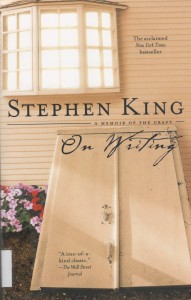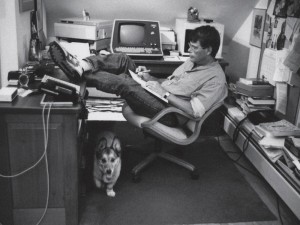Stephen King has been my own personal Holly Golightly for years. I am always wondering, “Is he or isn’t he?” Every time I read his work I ask myself the same question: Is he brilliant or just extremely capable when it comes to yanking our collective chain?
After reading On Writing I have finally come up with an answer, but I don’t think it is an answer you will like.  So, let’s postpone putting my little riddle to bed and get to the book.
So, let’s postpone putting my little riddle to bed and get to the book.
King sandwiches his advice to writers between two slim memoirs, the first of which he cites as his curriculum vitae. Here are the moments of his youth and young adulthood that he credits with shaping him as a writer. As with most of his stories, these are vivid experiences with which the reader immediately engages.
So vivid, in fact, that I will never again wonder why King’s writing always involves an element of gore — if not flat-out horror. Now I know about the protracted illness that at age six bought a long glinting needle into his ear, exterminating puss and initiating unbelievable pain, not once, not twice, but on three separate occasions. Now I am intimate with the image of maggots crawling up his arms as he loaded bloody laundry into washers all day long at a job he held for years. This man has plenty of material for gore, and he started collecting it young.
On the other hand, I will remember with the same crispness other, less gruesome scenes. After writing his first story his mother told him it was good enough to be in a book. She paid him a quarter and he kept on writing, “Four stories. A quarter apiece. That was the first buck I made in this business.” He collected all of his rejection letters on a spike on his bedroom wall and heeded the rare pieces of advice hand-written at the end of some. When he first saw his wife she was wearing a short yellow skirt and she laughed with a confidence that floored him.
These are honest personal stories and aside from setting a good example they carry a lesson. If you are going to be a writer you have to want it bad. You have to be willing to put in the time — to read, to write, and to rewrite. These are not the keys to the kingdom, but without them you will never make it to the gate. A further point to be gleaned here and throughout the book — if you are lucky, you will have someone in your life as sympathetic and encouraging as Tabitha King to get you through the rough spots along the way.
King opens his advice section by offering writers the fundamental tools of the trade. In their “toolboxes” they should all carry vocabulary, grammar, and style. His paradigm covers the obvious but essential. Your vocabulary should not be dressed up like a mutt in a ball gown. “The pet is embarrassed and the person who committed this act of premeditated cuteness should be even more embarrassed.” Grammar is necessary to good writing. “If you don’t have a rudimentary grasp of how the parts of speech translate into coherent sentences, how can you be certain that you are doing it well?” These are universally healthy admonitions for writers and I am delighted to see them offered up by someone so widely read — there are many out there who need them repeated.
 Style is muddier water to swim in for King, as this is where he starts to unleash his opinions about good writing. It is also where I start to really like this book. “The adverb,” he insists, “is not your friend.” If you restructure your sentence to avoid the use of an adverb, he will cheer for you. If you use one in dialogue attribution, he will find you. He cautions that only timid writers use the passive voice and that the paragraph is the foundation of writing. I do not agree with him across the board. Of course, there are accomplished writers who do not subscribe to these stylistic guidelines. However, this is not a primer for the established, more likely the novice in search of commercial success.
Style is muddier water to swim in for King, as this is where he starts to unleash his opinions about good writing. It is also where I start to really like this book. “The adverb,” he insists, “is not your friend.” If you restructure your sentence to avoid the use of an adverb, he will cheer for you. If you use one in dialogue attribution, he will find you. He cautions that only timid writers use the passive voice and that the paragraph is the foundation of writing. I do not agree with him across the board. Of course, there are accomplished writers who do not subscribe to these stylistic guidelines. However, this is not a primer for the established, more likely the novice in search of commercial success.
In the next section, On Writing, King reveals himself to be a man of many opinions, and not a shy one. In the act of describing the instruments a writer needs to hone his or her skills, he tells us exactly what he thinks of his contemporaries.
“One learns most clearly what not to do by reading bad prose — one novel like Asteroid Miners (or Valley of the Dolls, Flowers in the Attic, and The Bridges of Madison County, to name just a few) is worth a semester at a good writing school.
“Grisham’s make-believe tale is solidly based in a reality he knows, has personally experienced, and which he wrote about with total (almost naïve) honesty. The result is a book which is — cardboard characters or no, we could argue about that — both brave and uniquely satisfying. He deserves every buck The Firm made.
“There have been very successful writers — Arthur Hailey and James Michener are the first ones that come to my mind — whose novels rely heavily on fact and research. Hailey’s are barely disguised manuals and Michener’s are combination travelogues, geography lessons, and history texts.
“Many good dialogue writers simply seem to have been born with a well-tuned ear, just as some musicians and singers have perfect or near-perfect pitch. Here’s a passage from Elmore Leonard’s novel Be Cool. You might compare it to the Lovecraft and Katzenbach passages above, noting first of all that here we’ve got an honest-to-God exchange going on, and not a stilted soliloquy.”
These rants are a bit disturbing at first, considering King’s sensitivity to criticism, but I get the sense that this veteran of fiction is just calling them as he sees them — a stance I find refreshing. Do not forget that this is A Memoir of the Craft and with this subtitle our author has both solidified his authority and dispensed with the need for it. This writer has sold 37 bazillion copies of his numerous books and if the proliferation of his prose disheartens you, well, you are quite clearly in the minority. With that said, he is simply out to share what he has learned about writing, primarily the aspects most commonly taken for granted.
And yet, is it possible that the above estimation is too ideal? In King’s “First Forward” (there are three) he dedicates this book to Amy Tan who told him that in all of her Q-and-A sessions she wished she had been asked to talk about language. “Amy was right. They ask the DeLillos and the Updikes and the Styrons, but they don’t ask popular novelists.” And for all of the central truths that King hashes out in this volume, I am not surprised that his ilk is rarely sent up to bat. When I want to reflect on language I want to do it with Faulkner, Fitzgerald, Hemmingway, Steinbeck, James Joyce, Graham Greene, Nabokov, etc. So does King, and this man is WELL READ. In discussing narration, description, dialogue, pace, theme, character motivation, and backstory, King constantly cites the masters and proves himself an exceptional guide to our literary history.
“On Living: A Postscript” is the second memoir and the last section of On Writing. It details the infamous accident that nearly killed King in the summer of 1999, and though you are eager to know what happened, you wonder why it is included here. King’s recounting of the blue van running him down on the road is like a brush with one of his works of fiction. It is full of color, suspense, sympathetic characters, humor and not a little gore, but this time the ending is not a surprise. Or is it? King does not finish with his physical recovery, but his return to writing. He doesn’t claim that writing saved him or that he has to write to live, only this: “Writing isn’t about making money, getting famous, getting dates, getting laid, or making friends. In the end, it’s about enriching the lives of those who will read your work, and enriching your own life, as well.”
The end of the book brings us back to my impertinent question, “Is he or isn’t he?” Two points King makes in this book bring this to mind, so this ridiculous conundrum is not all my bad.
In the very beginning of the section “On Writing,” King admits that there are indeed bad writers out there. In laying out the talent pyramid he posits, “[W]hile it is impossible to make a competent writer out of a bad writer, and while it is equally impossible to make a great writer out of a good one, it is possible, with lots of hard work, dedication, and timely help, to make a good writer out of a merely competent one.” What is our man saying about his own place in the pyramid? If he is placing himself at the level of good writer rather than great, I’ll bet you any sum of money that he’s taking DeLillo, Updike and Stytron with him and leaving the upper echelon to past masters. However, I am not quite sure that is his game.
At the end of a piece discussing theme King reflects that there are only a few topics that captivate him, as far as writing goes. “These deep interests include how difficult it is — perhaps impossible! — to close Pandora’s technobox once it’s open. Why, if there is a God, such terrible things happen. The thin line between reality and fantasy, and most of all, the terrible attraction violence sometimes has for fundamentally good people.” I discover, after paying close attention to both our proclivities, that I am less interested in these issues. I like to read about writers, about men and women sussing each other out, and I love candid personal stories. Above all I value a well told tale, which to me requires good narration, description and dialogue.
If you haven’t caught my drift by now, all of this adds up to me loving this book. I am not sure that this will be a valuable tool for every fledgling writer, but it certainly won’t hurt him or her, and that is more than I can say for most books on writing. As to my little riddle, the arguable brilliance of Mr. King, the answer I have found is that I no longer care to argue. I spent a long time confounded by my admiration for his stories and my ambivalence toward his novels. I finally got a whole book to love and respect. I think I’ll just sit back and enjoy it.
[Originally published by The Simon.]

